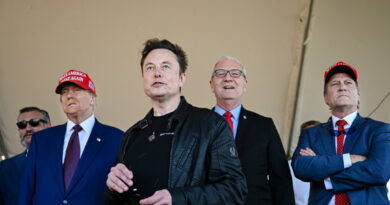Paraguayan President Aims to Strengthen Relations with the US During Trump Administration
The South American country boasts a rich history of camaraderie with the United States, which Peña aims to fortify.
WASHINGTON—The President of Paraguay, Santiago Peña, expresses optimism regarding collaboration with President Donald Trump’s administration to enhance his nation’s partnership with the United States.
“I foresee great times are ahead of us.”
Peña highlighted that, despite maintaining healthy relations, no Paraguayan president had been welcomed at the White House during the tenures of Presidents Barack Obama and Joe Biden.
He remarked that this amiable relation has led to Paraguay being somewhat overlooked by the United States.
“One of our major challenges is that we are not perceived as a challenge,” he quipped.
Peña also highlighted the long-standing economic partnership between the two nations, mentioning that Paraguay is among the few countries globally that experiences a trade deficit with the United States.
The Paraguayan economy is on the rise, with its poverty rate decreasing from 51 percent to 19.9 percent in the last 22 years. The country exports leather, sugar, and seed oils to the United States while importing technology and minerals.
In 2023, trade between the United States and Paraguay reached $2.8 billion.
Although Paraguay is one of the few landlocked countries in South America, it has a network of rivers and has developed the third-largest fleet of river barges globally, trailing only China and the United States.
In 2024, Paraguay achieved “investment grade” status from Moody’s, which classifies its bonds as low-risk investments.
While Peña is hopeful about the future of U.S.–Paraguay relations, he expressed disagreement with Trump’s choice to withdraw from global, multilateral initiatives like the World Health Organization (WHO).
On his first day in office, Trump signed an executive order allowing relevant agencies to commence the withdrawal of the United States from that organization.
“I would strongly urge the Trump administration to not turn their back on the multilateral system, but rather to reform it,” he remarked.
When questioned about some of Trump’s more contentious decisions, such as renaming the Gulf of Mexico to the Gulf of America, Peña shared that he has come to appreciate the president’s unconventional approaches.
“I must admit that during Trump’s first term, I struggled to grasp many of his strategies; however, I now understand them much better,” he noted.
“This focus on national security and identity, prioritizing America first, is not an opposition to Mexico or Canada, but rather a support for Americans and U.S. citizens. And I believe this perspective is indeed valuable.”





